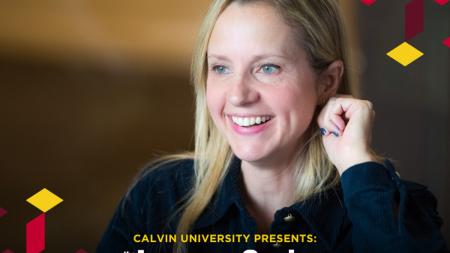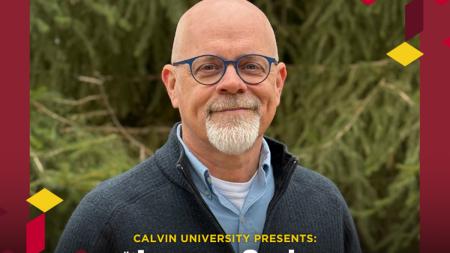Soul Food and Collective Memory

Caroline Randall Williams, an author, activist, and award-winning poet who teaches and writes as the writer-in-residence at Vanderbilt University, gave a talk titled “Soul Food and the Collective Cultural Memory” as part of the Calvin University January Series on Jan. 18.
The annual midday lecture series will continue through Feb. 2. It takes place at Calvin University’s Covenant Fine Arts Center and is also available via streaming and at some 50 sites around the world.
Williams began her talk by diving into the interrelations of family, place, and food.
“A sense of place is a profound thing,” she said. “Land has memories, and it teaches us how to hold, how to see, and how to resee the truth if we let it. And recipes do that precious work too.”
Food, Williams explained, carries an enormous weight of remembrance. Memories are made in the kitchen. Food passes through grandparents’ and parents’ hands and passes into the hearts of children. And food shares stories.
“A meal and a book do a lot of the same work,” Williams said. “One works on the body, and one works on the soul. Food sometimes tastes so good it changes your spirit, mends your broken heart, connects you to a past you fear you might forget.”
But not all food stories are happy ones.
Williams shared some of the stories that she inherited through food – and how some of those food stories are complex. She noted, for example, how cornbread, a Southern staple, was popularized as a cheap food for enslaved people. Maize fed the middle passage across the Atlantic; its nourishment allowed people to work from before dawn until after dark.
“When we come to the soul food table,” Williams said, “we eat historically, and we must remember.”
Williams’s exploration of her own personal food stories began, she said, when she worked as a high school English teacher in the Mississippi Delta. She found she best connected with her students when she ate as most of them did. She bought a stock pot, broccoli, and chicken; then she used her recipes to help teach her students about their culinary heritage, a heritage they had a right to be proud of.
After living in the Delta, Williams said she continued to explore her own food history through her grandmother’s old cookbooks. Her grandmother had passed away when she was a child, but the cookbooks provided Williams with a unique view into her family’s history.
She found hundreds of grocery lists tucked inside her grandmother’s cookbooks. The lists revealed a woman of paradoxes: a librarian, who would furiously read; a woman who loved to cook to care for her family; a woman who worked to support her husband’s efforts as a civil rights leader.
One particularly profound artifact tucked between the pages of a cookbook was a newsletter from a woman’s group in which her grandmother had participated. The newsletter called for the group to help support Williams’s grandfather, a senator; underneath the note, her grandmother had written two simple words: “Make posters.” Here, hidden in a cookbook, was evidence of her grandmother’s fire and fight, right beside the record of the food her grandmother’s hands lovingly made.
“She was always a light in the dark, always working to feed people’s bodies and souls,” Williams said.
Williams explained that finding those small pieces of her grandmother’s life inspired her to better understand who her family was. Cookbooks became more than just collections of recipes; they began to represent shared souls, forever-fixed plates with infinite ingredients.
By rediscovering her family’s recipes, Williams said, she similarly rediscovered the legacy of Black cooking itself. Soul food isn’t unhealthy; instead, it carries with it a longstanding history and serves as a door to both family and national history. To discover and make and eat soul food is to discover and be nourished by a strong, beautiful, and longstanding heritage, she said.


